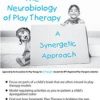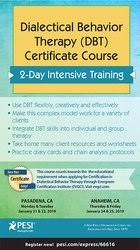Dialectical Behavior Therapy (DBT) Certificate Course; 2-Day Intensive Training – Steven Girardeau
$299.00 Original price was: $299.00.$85.00Current price is: $85.00.
Proof of item:

Dialectical Behavior Therapy (DBT) is an empirically validated approach for working with mental health, chemical dependency, and complex co-morbidity. Designed to empower clients to establish mindfulness, distress tolerance, emotional regulation, and interpersonal effectiveness, DBT assists clinicians in treating clients with emotional problems, suicidal, self-harm, and self-sabotaging urges and behaviors, and challenging interpersonal styles.
In this recording, you’ll receive a detailed understanding and foundation of the skills of Dialectical Behavior Therapy (DBT) as applied to clients with mental health and chemical dependency issues. Going beyond symptom management, these skills are designed to improve functioning to build satisfying lives.
This course explores DBT’s theoretical basis, specific DBT interventions, and how to teach skills in individual and group settings. Familiarity with these skills and techniques along with experiential exercises will enhance your clinical skills and professional development.
Guided by the latest research and policy in evidence-based practices, this course teaches the clinical process and content of DBT from theory to practice. Going beyond prescriptive applications, this course shows you how to use essentials such as validation, dialectical strategies, communication styles, and the best ways of changing behaviors in order to effectively balance acceptance and change with your clients. Complete with education on user-friendly diary cards and chain analysis protocols, you will leave this recording with increased DBT competency as well as many new tools including client worksheets to bring to your clinical practice.
Steve Girardeau, Psy.D., is not affiliated or associated with Marsha M. Linehan, PhD, ABPP, or her organizations.
- Explain the underlying theory of Dialectics and Dialectic Behavior Therapy. .
- Integrate DBT skills for individual and group therapy treatment into practice.
- Teach DBT skills in the areas of Mindfulness, Distress Tolerance, Emotional Regulation and Interpersonal Effectiveness to clients.
- Utilize specific DBT skills for the treatment of a range of mental health symptoms, chemical dependency and complex co-morbidities.
- Describe DBT tools and resources used to effectively change behavior.
- Articulate a variety of strategies for teaching DBT skills to clients.
- Demonstrate the use of crisis survival strategies to enhance distress tolerance
- Discriminate the DBT model from cognitive-behavioral, client-centered, and other treatment modalities.
- Practice a multi-layered approach to validation of clients’ thoughts and feelings.
- Apply DBT diary cards and chain (change) analysis techniques to address specific clinical issues in practice.
- Summarize how to effectively operate consultative groups and treatment teams
- Assess and manage self-injurious and suicidal behaviors with clear protocols and safety plans.
- Discuss the limitations and risks of DBT and areas of ongoing or future research regarding DBT effectiveness.
History & Philosophy of DBT
- Dialectics explained
- Core philosophies in practice
- Skills training techniques
- Limitations of the research and potential risks
Mindfulness Skills
- Grounded in the present while being connected to past & future
- Using core skills to achieve “Wise Mind”
- Learn classic and innovative mindfulness skills
- Mindfulness exercises
Distress Tolerance Skills
- Building frustration tolerance
- Utilizing crisis survival strategies and plans
- Learn classic and innovative Distress Tolerance skills
- Distress Tolerance exercises
Emotional Regulation Skills
- Understanding emotions and reducing vulnerability
- Incorporating self-care, opposite action and building positive experience
- Learn classic and innovative emotional regulation skills
- Emotional regulation exercises
Interpersonal Effectiveness Skills
- Balance in relationships
- Objective, relationship and self-respect effectiveness
- Learn classic and innovative interpersonal effectiveness skills
- Interpersonal effectiveness exercises
DBT in Practice
- Understanding how therapy works: The Contextual Model
- Evidence-based practice
- Maximizing therapeutic factors, DBT-style
- Essential elements and functions of DBT revisited
Structure Therapy
- Structure as a therapeutic factor
- Structuring the therapy environment
- Identifying treatment targets: suicidality, self-injurious behavior (SIB), therapy-interfering behavior (TIB), and other targets
Validation
- Levels of validation
- Validation as an informal exposure technique
Best Methods of Changing Behaviors
- Self-monitoring with the diary card
- Behavioral contingencies
- DBT-style cognitive interventions
- Behavior Chain (Change) Analysis
Communication Styles: Reciprocal and Irreverent Consultation Group
- Increase your motivation
- Develop effective responses
- Qualities of effective treatment teams
Next Steps: Develop Your Proficiency in DBT
Tag: Dialectical Behavior Therapy (DBT) Certificate Course; 2-Day Intensive Training – Steven Girardeau Review. Dialectical Behavior Therapy (DBT) Certificate Course; 2-Day Intensive Training – Steven Girardeau download. Dialectical Behavior Therapy (DBT) Certificate Course; 2-Day Intensive Training – Steven Girardeau discount.
1 review for Dialectical Behavior Therapy (DBT) Certificate Course; 2-Day Intensive Training – Steven Girardeau
| 5 star | 100 | 100% |
| 4 star | 0% | |
| 3 star | 0% | |
| 2 star | 0% | |
| 1 star | 0% |
Sorry, no reviews match your current selections
Q & A
Ask a question
Your question will be answered by a store representative or other customers.
Thank you for the question!
Your question has been received and will be answered soon. Please do not submit the same question again.
Error
An error occurred when saving your question. Please report it to the website administrator. Additional information:
Add an answer
Thank you for the answer!
Your answer has been received and will be published soon. Please do not submit the same answer again.
Error
An error occurred when saving your answer. Please report it to the website administrator. Additional information:
Related products
Personal Development
Cameron Blas – Filming And Editing Mastery With Final Cut Pro X
Personal Development
Personal Development
Personal Development
Personal Development
Personal Development
Personal Development
Personal Development
Reuben Brooks – The Ultimate Transformation – Meal Plan & Training Program













Just as described. Would buy from again. | Dialectical Behavior Therapy (DBT) Certificate Course; 2-Day Intensive Training – Steven Girardeau